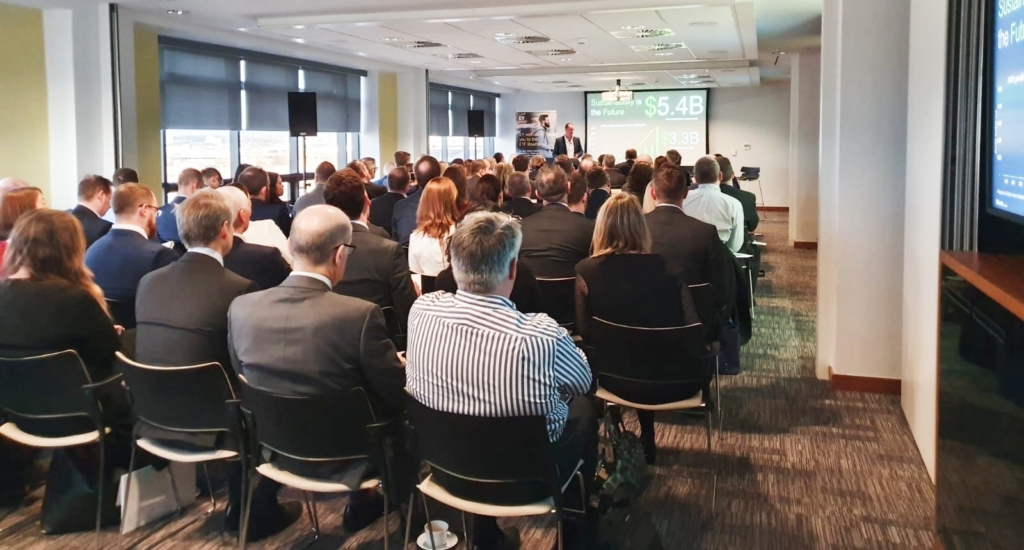EY’s annual Exchange Traded Funds (ETF) Roadshow kicked off this morning with a breakfast briefing in Dublin. The event brought together more than 100 thought leaders and decision-makers in the industry to hear speakers from EFAMA, Goodbody, Northern Trust, Goldman Sachs, Moorgate Benchmarks, BlackRock, LK Shields, Irish Life Investment Managers, EY and Central Bank of Ireland.
The morning’s agenda included keynotes and panels on product innovation (fixed income, ESG, and distribution considerations), legal and regulatory developments and the impact of Brexit on the market.
Lisa Kealy, EY’s Wealth & Asset Management Leader, welcomed attendees and provided an overview of the latest topics, trends, and developments in ETFs both globally and regionally. She said, “The ETF industry continues to go from strength to strength, and is set for another year of huge growth. We have seen geopolitical factors and market trends have a massive impact on flows and movements in the industry over the past 2 years, and that is likely to continue over the next two to three years.

Investors are weighing up developments in trade wars, slowing global growth, falling interest rates and uncertainty over Brexit and upcoming US elections. So there are many factors to consider and the challenge for the industry is to interpret how to offer solutions that reflect investors’ needs.”
Discussing trends in product innovation, Lisa said: “If we look at products, we have seen a 2-step shift in investor preferences, which has had a fundamental impact on the industry. Lower growth rates have pivoted investor demand from equities to fixed income products. At the same time, falling interest rates means that investors, looking for yield, have shifted to those higher-yielding assets, such as corporate bond and high yield.
ESG is one really exciting area. It is starting from a low base, but this is an opportunity for the industry to drive the ESG agenda forward by working with investors and index providers to bring to market the best ESG products. Europe is leading the way in ESG take-up, where the ESG investment philosophy has firmly made its way into investor conversations. So huge potential and an area that the industry is firmly supporting.”
As part of the event, EY partner Paul Traynor spoke with Gareth Parker, Chief Indexing Officer & Chairman of Moorgate Benchmarks. According to Parker, innovation is poorly served by the existing index providers, who prefer clients to “do things their way” rather than foster those innovators. He commented: “Index giants are extracting fees that exceed the value of the service they provide, purely because they can”. Parker also suggested the brand value in index providers will decline significantly over the coming five years, seeing a future where every investor – not just large asset owners but every investor – has his or her own customised indices, implemented primarily via ETFs.
Catharine Dwyer, Senior Policy Advisor, Central Bank of Ireland, spoke on a panel on Legal and Regulatory Influences saying: “The regulatory agenda is tilting – the post-crisis focus on market liquidity, maintaining market integrity and identifying possible sources of systemic risk continues. Regulatory authorities are increasingly assessing the appropriateness of their toolkits not only from a micro-prudential perspective but also from a macro-prudential viewpoint. Products such as ETFs remain in the headlights because of their liquidity features, their interconnectedness and their growth. The process of fully understanding them from a regulatory and systemic perspective is well underway with the Central Bank being fully engaged in, and leading international discussion in these areas.”
Federico Cupelli, Senior Regulatory Policy Advisor at European Fund and Asset Management Association (EFAMA) also commented: “Recognising the significant growth in ETF adoption, EFAMA is glad the securities regulators within IOSCO have taken the lead in looking more closely at the broader ETF ecosystem, comprising APs, market-makers and exchanges. For the time being, financial stability concerns raised in corners of the central banking community remain unjustified, highlighting the need for a better understanding of the ETF product itself and how it operates compared to an ordinary mutual fund, especially in times of market stress. Lastly, the fact that ETFs in Europe are mostly licensed as UCITS products should also be underscored.”
The roadshow continues with events in London tomorrow, 13th November, and Luxembourg on 14th November. See details of these events.